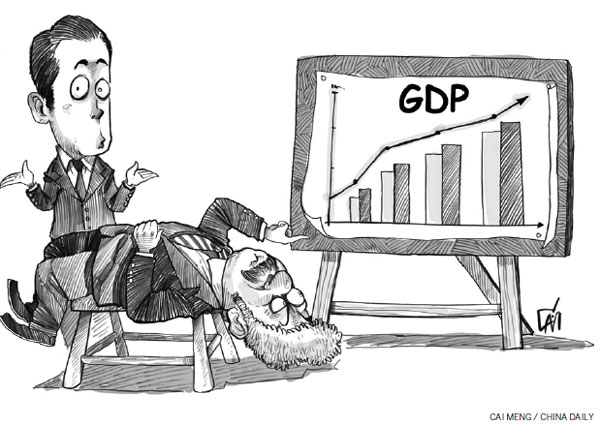GDP data methodology adheres to accepted standard
By Xu Xianchun (China Daily) Updated: 2016-01-25 08:04

Some research bodies and media outlets have questioned the veracity of China's official GDP data, claiming it's exaggerated. Such allegations are groundless.
To comprehensively and accurately calculate its GDP data, China has formulated a set of GDP accounting methods that are based on the principles of the System of National Accounts applied by the United Nations and other major international organizations and which take into account its national conditions.
The scope of China's GDP accounting and its adopted principles and methods are in line with the SNA, while the standards for its industrial classification and the product classification are based on the International Standard Industrial Classification of all Economic Activities and the Central Product Classification system promulgated by the United Nations Statistical Commission. The classification of its household consumption expenditures introduced to its GDP data is also based on the Classification of Individual Consumption According to Purpose applied by the UN to classify both individual consumption expenditure and actual individual consumption. While the scope of the country's fixed assets and their classification are also basically in line with the SNA.
The adoption and use of all these have created feasible conditions for China to comprehensively and accurately calculate its GDP and realize the international comparability of the data.
Since it began its GDP accounting in 1985, China has continuously pushed forward reform of the system with concrete practice. In 1993, the SNA system was adopted, which established GDP as the core index of national economic accounting, and the country has ever since made continuous revisions and improvements to its established GDP accounting formula based on concrete practices and also the experiences of other countries. It has also continuously increased the transparency of its GDP statistics and accounting. To guarantee the accuracy of its GDP data, the National Bureau of Statistics adopts multiple ways to conduct repeated checks on and evaluations of essential data and accounting results, and revisions are made when problems are discovered in the process of data checks and evaluations.

I’ve lived in China for quite a considerable time including my graduate school years, travelled and worked in a few cities and still choose my destination taking into consideration the density of smog or PM2.5 particulate matter in the region.











